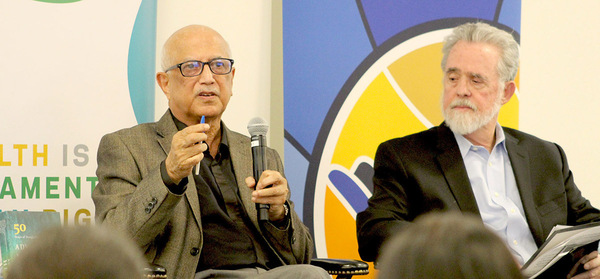In a panel discussion and book launch on Nov. 7, the Pulte Institute and the Eck Institute for Global Health welcomed Visiting Scholar Mushtaque R. Chowdhury to talk about his latest book, 50 Years of Bangladesh: Advances in Health.
Eck Institute Director Dr. Bernard Nahlen opened the event, highlighting the transformative journey of Bangladesh’s health sector, emphasizing its impressive growth and the incredible work of the non-governmental organization, Bangladesh Rural Advancement Committee (BRAC), in this evolution. Nahlen reflected on the history and challenges of Bangladesh, expressing admiration for the country’s achievements since its independence in 1971.

Visiting Notre Dame Scholar Mushtaque R. Chowdhury, left, former vice-chair of the globally celebrated non-governmental organization BRAC, answers a question from panel moderator Ray Offenheiser, director of the McKenna Center.
Dr. Mushtaque Chowdhury, a pivotal figure in Bangladesh’s health sector, shared his insights and experiences. Chowdhury spent four decades with BRAC, serving as its vice chair, executive director, founding director of the research and evaluation division, and the founding dean of the BRAC James P. Grant School of Public Health.
Chowdhury is also a Population and Family Health professor at Columbia University and was a senior adviser and acting managing director at the Rockefeller Foundation.
During the discussion, Chowdhury highlighted Bangladesh’s health challenges and successes. He pointed out the remarkable transition in life expectancy trends, with women now living longer than men, aligning with global norms. (Until 2000, Bangladesh was one of three countries worldwide where men had a higher life expectancy.)
Despite low healthcare investment compared to countries like the U.S., Bangladesh has significantly reduced poverty and improved public health. (Bangladesh has a meager investment in healthcare, especially compared to the United States. As a share of the U.S.'s Gross Domestic Product, health spending accounts for over 18 percent. In Bangladesh, it remains under 3 percent of GDP.)
Chowdhury underscored the impact of community health initiatives, including the widespread training of community health workers and public outreach programs in family planning and sanitation. He praised the implementation of oral rehydration therapy, a simple yet life-saving solution drastically reducing deaths from diarrheal diseases.
Another public health success has been the dramatic increase in routine vaccinations for children, from a mere 2 percent to 70 percent coverage in five years, thanks to collaborative efforts between the government and NGOs like BRAC. Chowdhury also touched on the broader socio-economic advancements in Bangladesh. The country’s economic growth, increased rice production, and improved status of women have been internationally recognized. Chowdhury attributes these achievements to collaboration among various actors — the government, the private sector, and NGOs.
Focusing on BRAC’s approach, Chowdhury explained how the organization views poverty holistically, addressing not just income but also education, healthcare, women’s empowerment, and other factors. He emphasized BRAC’s commitment to sustainability, innovation, and its significant financial independence efforts. Today, 80 percent of BRAC's income is generated from its enterprises.
The event concluded with a note on the complex yet productive relationship between the government and NGOs in Bangladesh, highlighting their shared commitment to implement public welfare programs effectively and innovative approaches to be replicated in other global health systems.